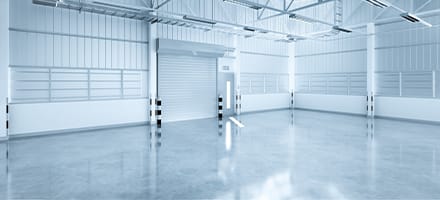When choosing commercial floor coating, you have to consider the important factors, including safety, durability, and maintenance, reflecting the unique demands of your industry and business.
Some matters are universal to nearly every commercial operation – whether you’re coating a mall floor, the lobby of a tower downtown, or a manufacturing space laden with heavy-duty machinery.
1. OPERATION INTERRUPTION
No matter how you spin it, there will be some interruption on a mass-scale concrete surface prep installation. Of course, there are ways for managers and workers to adapt to this interruption – working around shifts and breaks, scheduling machinery and production lines for odd-hour operations.
However, your best bet at minimizing your business’s interruption (especially for those running a 24-hour cycle) is a polyurethane coating that bonds and sets quickly.
2. ENVIRONMENTAL INFLUENCES
Suppose you’re in manufacturing, and your production experiences everyday spills or leaks. In that case, you’ll want a coating capable of taking on slip-resistant additives like Spartacote Diamond Topp.
Traction additives like these are high-performance and intended for intense environments that demand serious skid and abrasion resistance. The same goes for commercial gym flooring or kitchen floors with heavy foot traffic and spill potential. The last thing managers need is an injured worker or guest.
3. OUTDOOR-VS-INDOOR DEMANDS
Then there’s the matter of the elements. Ultraviolet rays and weather can significantly influence the long-term survival of your concrete coating.
Look for Key Resin UV-resistant epoxy coatings for outdoor applications or surfaces with regular exposure to natural light, and use a polyaspartic top coat for extra support.
Similarly, some coats are better than others indoors – especially if you have workers or guests nearby. Look for low-odor, quick-drying coats as your best option here. Urethane coating/sealers are a top choice for low-odor applications and fast curing time. Check out our Key Resin polyurethane options to learn more.
4. BRANDING AND DESIGN
Some concrete coating choices are better than others for design purposes. Of course, not all businesses prioritize guest perceptions of their surfaces – especially production industries where only workers walk. But for B2C operations especially, property owners and designers will want a long-lasting coat with good color retention.
WHAT COATING TYPE IS BEST FOR DESIGN PURPOSES?
Consider using a polyaspartic top coat when designing, as these products have excellent gloss and color retention capabilities. They also have good abrasion and scratch resistance – making them a perfect choice for designers and owners concerned about long-term visual appeal.
5. THE PROJECT’S BUDGET
Only some budgets lends well to the highest quality finished coat. The cost of introducing additives and pigments, paying for labor, and halting operations can add up quickly. But that doesn’t mean you have to skimp out on what’s vital for your commercial flooring.
Good quality epoxy coatings are efficient for a wide range of applications and relatively inexpensive compared to other options – depending on the size of your space and if you’re looking for a short- or long-term solution.
Beyond budget considerations, floor coatings’ durability and specific applications are relevant to long-term satisfaction and performance considerations.
WHAT IS THE MOST DURABLE FLOOR COATING?
Epoxy and polyaspartic coatings are often compared for their longevity and resilience.
Epoxy floor coatings are renowned for their strength, providing a hard-wearing, dense surface that can withstand heavy loads, making them ideal for warehouses and industrial settings.
Polyaspartic coatings, on the other hand, offer a unique blend of durability and flexibility, with the added advantage of UV resistance and a faster curing time.
Both options ensure a long-lasting finish that maintains its integrity and appearance under the rigors of commercial use. Understanding the longevity of these durable coatings, particularly epoxy, helps plan for maintenance and future renovations.
HOW LONG DOES AN EPOXY FLOOR LAST IN COMMERCIAL SETTINGS?
Epoxy floors are celebrated for their longevity, typically lasting between 5 to 10 years in commercial settings, depending on the level of traffic and how well they are maintained. Regular cleaning and the occasional reapplication of the topcoat can extend an epoxy floor’s life significantly.
Factors such as the quality of the installation and the specific formulation of the epoxy used play a role in determining the overall lifespan of the flooring. Investing in a high-quality epoxy coating and professional installation can yield a durable, visually appealing floor that withstands the test of time.
With durability and budget in mind, choosing the right coating for specific areas (such as shop floors) becomes a critical final step in our discussion.
WHAT IS THE BEST COATING FOR A SHOP FLOOR?
Polyaspartic coatings stand out for their rapid curing times, durability, and resistance to stains and abrasions, making them an excellent choice areas with a lot of activity and requiring minimal downtime. These coatings protect against wear and tear and enhance the floor’s aesthetic appeal with various finishes and colors.
Also, consider the following factors when choosing your coating:
- The level of traffic
- Potential chemical spills
- Need for quick and easy cleaning
NEXT STEP
Selecting the right commercial floor coating involves balancing various factors, from operational needs to aesthetic desires and budget constraints. Runyon Surface Prep offers a complete range of flooring solutions tailored to meet the unique needs of your business.
